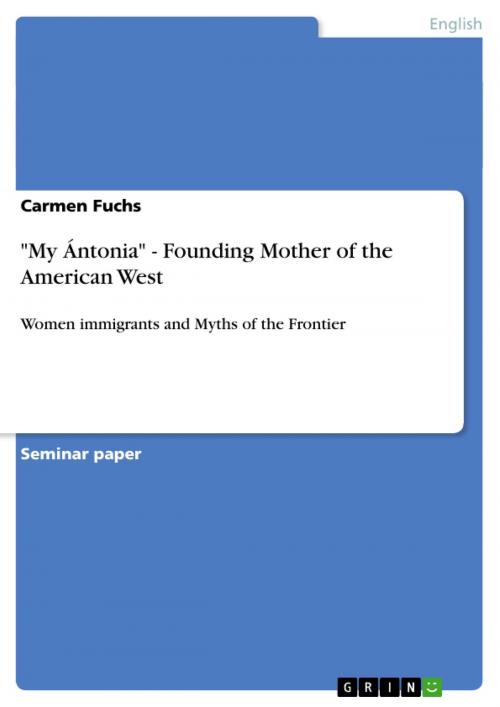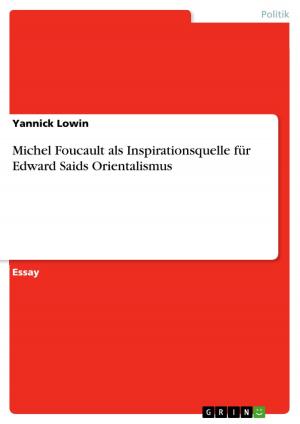'My Ántonia' - Founding Mother of the American West
Women immigrants and Myths of the Frontier
Nonfiction, Entertainment, Drama, Anthologies| Author: | Carmen Fuchs | ISBN: | 9783640960385 |
| Publisher: | GRIN Verlag | Publication: | July 18, 2011 |
| Imprint: | GRIN Verlag | Language: | English |
| Author: | Carmen Fuchs |
| ISBN: | 9783640960385 |
| Publisher: | GRIN Verlag |
| Publication: | July 18, 2011 |
| Imprint: | GRIN Verlag |
| Language: | English |
Seminar paper from the year 2006 in the subject American Studies - Culture and Applied Geography, grade: 1,7, University of Freiburg (Seminar of North American Studies), course: Female Appropriations in the Girl Western, language: English, abstract: The identity of America as a nation is an issue not only amply discussed by politicians and sociologists past and present, it has been a topic of America's writers and artists long since the country's foundation. In quest of an American identity which was emancipated from its European models 19th century writers were among the first to explore the myth of the American West. Especially in the early nineteenth century, writers were strongly orientated towards Europe and European writing styles as many young American authors seemingly did not believe their country capable yet of constructing an autonomous literary canon that would reflect a credible literary voice of the young nation. The problem of having no literary home and roots can be copiously observed in the works of Herman Melville, many of his novels and pieces of short fiction featuring the individual's homelessness and the experience of being lost in space and time. Melville wrote about themes which would eventually resurface in the writings of Modernist poets and writers of the 1920s. Willa Cather, however was accused of being a reactionary because she placed setting her masterpiece My Ántonia in the rural American Midwest. My Ántonia however shows that what many Modernist writers seemed unable to see: the Frontier was not simply a cheesy myth of dime novels but the perfect symbol of America as a nation comprised of the rootless who had no sense of home and for whom moving on was the only solution to this dilemma. If there ever was an idea of creating an American nation, the Frontier certainly is and was the strongest image of it. It is mostly perceived as a white male myth, and thus Will Cathers offers a different perspective of the Frontier: the role of immigrants and women on the Frontier. To understand the Modernist writers' general opposition to the Frontier theme and in order to fully comprehend Cather's contribution to American Modernism, one needs to gain insight into various aspects of Frontier literature, namely the Western and the Pioneer Novel. The works chosen for this portrayal are Owen Wister's The Virginian and Hank's Woman and Laura Ingalls Wilder's Little House on the Prairie because of their contrast to My Ántonia regarding the portrayal of women, immigrants and the Frontier Myth.
Seminar paper from the year 2006 in the subject American Studies - Culture and Applied Geography, grade: 1,7, University of Freiburg (Seminar of North American Studies), course: Female Appropriations in the Girl Western, language: English, abstract: The identity of America as a nation is an issue not only amply discussed by politicians and sociologists past and present, it has been a topic of America's writers and artists long since the country's foundation. In quest of an American identity which was emancipated from its European models 19th century writers were among the first to explore the myth of the American West. Especially in the early nineteenth century, writers were strongly orientated towards Europe and European writing styles as many young American authors seemingly did not believe their country capable yet of constructing an autonomous literary canon that would reflect a credible literary voice of the young nation. The problem of having no literary home and roots can be copiously observed in the works of Herman Melville, many of his novels and pieces of short fiction featuring the individual's homelessness and the experience of being lost in space and time. Melville wrote about themes which would eventually resurface in the writings of Modernist poets and writers of the 1920s. Willa Cather, however was accused of being a reactionary because she placed setting her masterpiece My Ántonia in the rural American Midwest. My Ántonia however shows that what many Modernist writers seemed unable to see: the Frontier was not simply a cheesy myth of dime novels but the perfect symbol of America as a nation comprised of the rootless who had no sense of home and for whom moving on was the only solution to this dilemma. If there ever was an idea of creating an American nation, the Frontier certainly is and was the strongest image of it. It is mostly perceived as a white male myth, and thus Will Cathers offers a different perspective of the Frontier: the role of immigrants and women on the Frontier. To understand the Modernist writers' general opposition to the Frontier theme and in order to fully comprehend Cather's contribution to American Modernism, one needs to gain insight into various aspects of Frontier literature, namely the Western and the Pioneer Novel. The works chosen for this portrayal are Owen Wister's The Virginian and Hank's Woman and Laura Ingalls Wilder's Little House on the Prairie because of their contrast to My Ántonia regarding the portrayal of women, immigrants and the Frontier Myth.















